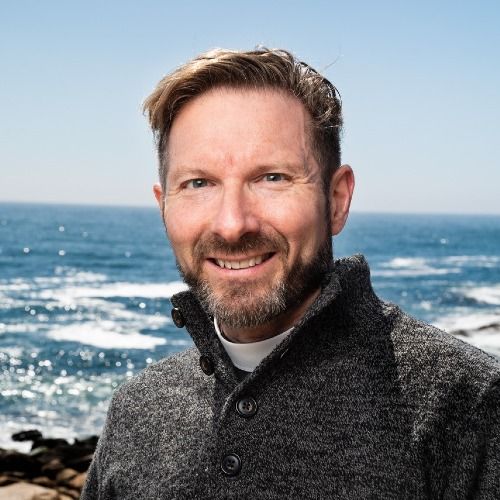Episode 40
Bishop Nicholas Knisely's Sermon, June 25th 2023 St. Peter's by-the-Sea
Bishop Knisely's Sermon on how two things can be different and true at the same time.
Transcript
May I speak to you in the name of the one, holy and Triune, God, the
Speaker:Father, the Son, and the Holy Spirit.
Speaker:Amen.
Speaker:Please be seated.
Speaker:Thank you for that, Hymn.
Speaker:That's my favorite hymn at, I remember about 11 years ago
Speaker:when I was elected Bishop.
Speaker:And it, I was in Arizona and it was very early in the morning and Karen and I
Speaker:were still finishing up breakfast and I was in my bathrobe and the electing
Speaker:convention called me and they had me on speaker phone and they wanted to
Speaker:surprise me by singing my favorite hymn.
Speaker:So I told them what my favorite hymn was and they said, I don't know that one.
Speaker:So thank you for learning it well enough that I had a treat on this almost
Speaker:the 11th anniversary of my election.
Speaker:Sometimes things are not what they seem to be.
Speaker:Sometimes things are not what they seem to be.
Speaker:We think we know what's going on, but what's actually happening is
Speaker:something completely different.
Speaker:I don't know.
Speaker:I was thinking I was gonna have to rewrite this whole sermon yesterday afternoon.
Speaker:As I was scrolling Twitter frantically trying to figure out what was going
Speaker:on in Russia, it seemed like there was a coup, perhaps even a civil war.
Speaker:And I was getting worried about what that would all mean.
Speaker:And then all of a sudden it was like psych and it wasn't.
Speaker:I looked on Twitter because on Twitter you can find someone who will explain
Speaker:everything to you, and Twitter told me that this was all a CIA plot.
Speaker:And another person on Twitter I thought was very interesting, said,
Speaker:you stupid Americans, you think everything revolves around you.
Speaker:Sometimes we think we know what's going on, and sometimes we think it's our story.
Speaker:And we want to understand it through our lens and our experience.
Speaker:And in fact, it has nothing to do with us.
Speaker:It is somebody else's story, and we are just touched by it briefly.
Speaker:When I was in graduate school and I should have been doing research,
Speaker:I was instead reading a series of fantasy novels in my lab.
Speaker:And I remember the novels, the Bulgaria series.
Speaker:And a young boy in the series is the focus of a great cosmic prophecy,
Speaker:and the story in the book is how at each sort of juncture in his
Speaker:life, there is a fulfillment of the prophecy, and the prophecy
Speaker:actually speaks to him in his head.
Speaker:And so everything that happens is full of meaning and import in
Speaker:the story, except this one thing.
Speaker:The boy is standing in a field and a far off in the distance.
Speaker:He sees a young colt trotting across the field to him, and the colt
Speaker:walks right up to him and muzzles his hand with the colt's nose, and
Speaker:he hears the sound of the prophecy.
Speaker:Hm.
Speaker:The whole of the atmosphere is filled with that quiet ringing bell, and he
Speaker:wonders to himself, what does this mean?
Speaker:And the prophecy speaks in his head and says, nothing to you at all.
Speaker:This is not your story.
Speaker:This is part of another story.
Speaker:And I remember thinking about that because it reminds us that sometimes we really
Speaker:do think that we are the main character of everything, and sometimes we are not.
Speaker:And something much more important is happening to somebody else than to us.
Speaker:In the Old Testament lesson today, the story of Ishmael and
Speaker:Hagar, we hear the story of Hagar.
Speaker:We hear of how Ishmael becomes the father of a great nation, and
Speaker:we also only see them briefly.
Speaker:They disappear from the story of the children of Abraham, at least for us.
Speaker:You remember how this goes?
Speaker:Abraham and Sarah are promised by God that they shall have a great
Speaker:many children and they shall father a nation whose descendants will be
Speaker:as many as the stars in the sky.
Speaker:No, but they're pretty old.
Speaker:They're in their eighties and they know how this works.
Speaker:People don't usually have children in their eighties, and
Speaker:they started to get nervous.
Speaker:And so Sarah wanting to help God along, took one of her slaves, an Egyptian
Speaker:princess who has somehow become a slave in Abraham's house, Hagar,
Speaker:and said, go sleep with my husband.
Speaker:And they did, and they had a child and they had Hagar deliver
Speaker:the child on Sarah's lap, and they said, this is the new child.
Speaker:This is the error to the promises, Ishmael.
Speaker:Well, God was not pleased, and in fact, a few years later the angels
Speaker:came and Sarah was given her own child and they named that child Isaac.
Speaker:Well, here's a problem.
Speaker:You've got Ishmael running around and you've got Isaac and Sarah's saying, well,
Speaker:but, but my child is the one God likes.
Speaker:And one day she sees Ishmael and Isaac playing together.
Speaker:She gets upset with that.
Speaker:She's worried that maybe this isn't going to work out the way she wants to.
Speaker:And so she says to Abraham, get rid of her and get rid of the kid.
Speaker:And Abraham is torn.
Speaker:So he sends Hagar and Ishmael into the desert, gives him a skin
Speaker:of wine, good luck, and sends them into the desert to die.
Speaker:And Sarah feels better about things.
Speaker:But what about Hagar?
Speaker:And Ishmael turns out as the story goes, God heard the cries of Ishmael.
Speaker:And God saved Hagar and Ishmael in the desert and through
Speaker:Ishmael raised up a great people.
Speaker:Ishmael was the father of the people of the Arabian Peninsula.
Speaker:The Arabs recognized their dissent through him just as the Jewish P people
Speaker:recognized their dissent through Isaac.
Speaker:And this becomes a problem because you have a fight even today
Speaker:between the Arab people and the Jewish people in the Holy Land.
Speaker:And both are using this story to explain why they are more loved by God.
Speaker:If you read in the Quran, they say, look, Ishmael was the firstborn.
Speaker:Clearly, he is the one who inherits the promise of God.
Speaker:And it is through Ishmael that Abraham's children have filled the earth.
Speaker:And if you read in Torah, it says, no, it was through Isaac, because God
Speaker:always works through the outsider.
Speaker:He works through the second son.
Speaker:He works through the, oh, I don't know what was, what was David?
Speaker:He was like the eighth son, right?
Speaker:He works through Jacob, the second born twin.
Speaker:He works through, oh, I don't know Jesus, who didn't really even have
Speaker:a father that people could tell.
Speaker:There's always this thing that God does of working through the outsider, so you
Speaker:recognize God, but the people who read the Quran have a completely different story.
Speaker:The story of Hagar and the story of Ishmael are also part of
Speaker:the story of God's family, but they're not part of our story.
Speaker:They're part of a different story, and it's probably.
Speaker:Just as important a story as our own story, even though it only happens
Speaker:briefly within the Bible, and then they pass from the annals of our history.
Speaker:They have their own story.
Speaker:If you talk to Arabic people, if you talk to people who read the Quran, who follow
Speaker:Islam, they will tell you that no, no, no.
Speaker:Hera or Hagar was oppressed.
Speaker:She was enslaved.
Speaker:She was forced by the cruel mistress, Sarah to have this child, and then they
Speaker:took the child from her, and when they no longer needed the child, they disposed
Speaker:of them both in the desert to die.
Speaker:It's actually pretty awful when you think through how the story is being told.
Speaker:And the Jewish people have a different story.
Speaker:If you read the midrash on this, they will say, well, no, actually it was
Speaker:Sarah's saintliness that was willing to have Hagar take a child up for Abraham.
Speaker:And she put aside her own rights and it's completely different
Speaker:account of how this all works out.
Speaker:And they both use it to justify their own position.
Speaker:Look, God saves Hagar either way through Sarah's behavior,
Speaker:whether it is saintly or selfish.
Speaker:If you take it as the story tells it through her selfish behavior,
Speaker:Hagar and Ishma are sent in the desert so that God can encounter
Speaker:them in the desert and save them.
Speaker:God is using the unexpected.
Speaker:That happens again and again and again in the Bible sometimes.
Speaker:That act of shunning and pushing out is the way that God actually saves us.
Speaker:It was the pushing out of Hagar and Ishmael that God used to save them.
Speaker:Sometimes we see this again and again in our own story.
Speaker:God pushes us out to save us.
Speaker:It's taught that it is said that in the Episcopal church, most adult members were
Speaker:originally raised in a different faith.
Speaker:I won't ask you to put your hands up, but it's something like 40 or 50%
Speaker:of Episcopalians, maybe more these days were either Roman Catholic or
Speaker:were another tradition and found their way into the Episcopal Church.
Speaker:And when I talk to people who come out of those other traditions, it's hard because
Speaker:you have to upset your grandparents.
Speaker:You have to upset your family.
Speaker:Sometimes you have to be honest about who you are.
Speaker:To find a home in an Episcopal church, but it is through the shunning of
Speaker:your family that you found this place, and it is here, that you are finding
Speaker:the stories of God and being fed.
Speaker:It is through the unexpected that God has saved you.
Speaker:Your story is now different than your family's story, at least for a while.
Speaker:In the gospel, Jesus says, look, I come into the world to bring truth,
Speaker:and that truth will divide families.
Speaker:He doesn't say it's gonna make one family member right, and the other family wrong.
Speaker:He says it will divide families.
Speaker:And I think that's an important piece for us to keep in mind that
Speaker:the truth sometimes does cause us to be divided, but sometimes two
Speaker:things can be true at the same time.
Speaker:Two things can be true at the same time, if you have half an hour, I'll teach
Speaker:you a brief class on quantum physics and show you how this is not just a metaphor.
Speaker:This is actually true.
Speaker:And in fact, all those cool things that your cell phones can do depend on the fact
Speaker:that two things are true at the same time.
Speaker:Well, the same is true in our faith life as well.
Speaker:Frank Griswold once said that we have to learn to live into a world
Speaker:that is filled with chloroform truth.
Speaker:That means multiple truths, and that means we have to hold our truth and our
Speaker:story lightly, that this is our story.
Speaker:But it does not mean your story isn't true for you as well.
Speaker:Your experience is valid.
Speaker:Their experience is valid.
Speaker:And if we can hold that and know that sometimes there are two stories being
Speaker:told that the truth is dividing us but is not requiring us to turn on each
Speaker:other, it is just requiring us to take different paths, at least for a while.
Speaker:If you can do that, you actually find that we can rebuild community
Speaker:much more effectively because we haven't burned any bridges.
Speaker:We haven't turned away from each other, and we can undo maybe someday what
Speaker:has happened in the Middle East, what is happening today in our society,
Speaker:what is happening in our families, what is happening all around us?
Speaker:Just recognizing that you can be right and your neighbor can be right,
Speaker:but maybe right now you're both going to be right in different ways.
Speaker:So, And being comfortable with that.
Speaker:Like I said, it seems to be the way the universe works.
Speaker:Look at this story.
Speaker:How old was Ishmael in the story?
Speaker:If you count on your fingers, he's 16, and yet it says that Hagar carries him.
Speaker:As a 16 year old into the desert and leaves him under a
Speaker:bush to cry himself to death.
Speaker:How old is Hagar?
Speaker:How old is Ishmael?
Speaker:There are contradictory details even in this story of contradiction.
Speaker:Truth is complicated and chloroform and multifaceted, and we celebrate that cuz
Speaker:it reminds us that that is true about God.
Speaker:And that is true about us.


